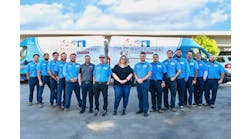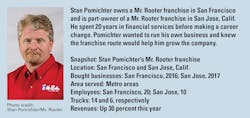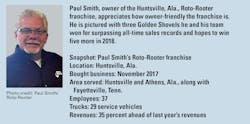Latest from Plumbing Contractor
Sponsored
Most small-business owners have an entrepreneurial spirit. They are fervent believers in building businesses to thrive and survive by offering customers the best solutions to their problems for a good price, and in doing so providing successful careers to themselves and their employees.
However, some of these owners do not have backgrounds or educational knowledge of business – or the industry they want to serve. This is when buying a franchise business is a smart move. Franchises have a proven system of operation through documented processes and procedures that guide the entrepreneurial franchisee through the labyrinth of business development, sales and marketing, customer service, employee documentation, human resources and training.
The plumbing industry has many well-recognized franchise brands; the trick is finding the right fit, especially if the potential franchisee is coming from another industry.
Stan Pomichter, who owns two Mr. Rooter operations in California (San Francisco and San Jose), spent the first two decades of his work life on Wall Street – first at Goldman Sachs and then for a couple of hedge funds. “I’d always wanted to run my own company and build a business,” he says. “I moved my family to the West Coast four years ago and started looking at businesses to buy because I didn’t have experience in any industry besides finance.”
At the same time, Pomichter was renovating a house he was planning to sell. He had a difficult time getting plumbers to respond to him or to show up on time. “I thought it might be an industry to look into,” he says. “After doing some research, I realized plumbing is an important service industry. It’s not going away. So, I started looking at well-run plumbing companies I could buy.”
A mechanical engineer, Pomichter had limited experience with plumbing. But he wasn’t a plumber, so buying into a plumbing franchise business seemed to be the best way for him to enter the industry. “I knew the franchise would give me the brand recognition I would need to grow the business,” he explains. “It gives you some structure. Because I wasn’t a plumber and had no experience in plumbing, I thought it made sense to buy a franchise.”
Both of Pomichter’s businesses were Mr. Rooter franchises when he bought them. But first he met with The Dwyer Group to research the Mr. Rooter franchise and was impressed. He especially liked the network of franchise owners who he could call and get advice from about any problems or concerns he had.
“Even when I was not a franchisee, when I was just a candidate, they opened themselves up and let me visit their operations,” he explains. “They talked to me openly about their financials and various pitfalls they encountered. It’s healthy to have a good network like that. The Mr. Rooter culture and code of values – it’s not just words, they believe in it and deliver on it. The organization wants franchisees who care about people, want to build teams and want to be in business for a long time.”
On the other side of the country, Paul Smith left his 30-year career in the automobile sales industry to take over a Roto-Rooter franchise in Huntsville, Ala. “I was ready for a change and a new direction,” he explains. “I wanted something outside of the automotive industry where I could use what I had learned in a different field. The use of hands-on talent called me to the plumbing industry.”
Smith watched television shows such as ‘Dirty Jobs’ and heard industry experts warn that the industry was in urgent need of skilled workers. “I noticed so many plumbing companies in my city with bad advertisements, dirty trucks and no presence on the Internet,” he notes. “It became obvious to me that they couldn’t hire the right kind of trained staff to handle their marketing needs. I knew I had the opportunity to create growth and success just through awareness and branding.”
After his years in the automotive industry, Smith understood the importance of branding and name recognition. “Like the automotive sector, the power of a name-brand franchise provides power and acceptance,” he says. “The Roto-Rooter franchise program is as solid as I have ever witnessed. I have looked at many opportunities and many franchise agreements and none is as owner-friendly as Roto-Rooter’s. The way a franchise agreement is written will tell you everything about the culture of the company, I believe.”
As he considered a career move with the franchise, he spoke to other Roto-Rooter franchisees, who had nothing but positive things to say about the leadership and the company. However, Smith did have a little bias toward Roto-Rooter as the man who brought the franchise to Huntsville in 1963 was his father’s best friend.
“I grew up listening to his stories and saw the business he grew,” Smith recalls. “The family culture and how he helped so many people who were having plumbing emergencies planted a seed in me. That seed continued to get watered and fertilized by the next owners he sold to. We grew up in church together and I saw how Roto-Rooter provided them the ability to give to others less fortunate. When the opportunity came for me with this local store, I jumped at it. For me to have my own business and have the ability to positively affect so many people was a dream come true.”
Structure and teamwork
One of the biggest perks of being part of a national franchise is the quality of training and support provided by people focused on making sure each franchisee is successful – business support, financial education and employee training.
“I’ve never owned a company before but I have a finance background,” Pomichter notes. “Mr. Rooter teaches franchisees about financials, such as where your margins are compared to the margins for the industry. They also talk about structure, processes and procedures. For an owner early on, they’ve got some good training. If you have questions about anything, Mr. Rooter has an operations manager you can talk to.”
Smith notes: “The support from the Roto-Rooter training center, the area managers and the executive management is absolutely incredible. No question is ever turned away and the response time is the quickest I have ever witnessed in any corporation I have been a part of.”
Each franchise assumes that plumbing techs and office staff have the requisite education and licenses to work in the industry, so they focus on sales and customer training for workers. Customer service representatives and plumbers have the most contact with customers, so it’s important that employees working in those areas are well-versed in the brand’s processes and procedures.
When it comes to recruiting new employees, both men acknowledge it can be a struggle. While their respective franchises do help them with outreach efforts, online job boards and recruiting trends, hiring good employees comes down to the individual franchisees and what works in their local area.
“Hiring technicians is a very difficult thing,” Pomichter notes. “It’s a long process. We’re starting a training program to train our guys internally. I spent some time in the Army and I would love nothing more than to find people who are prior military or with different backgrounds and train them how to succeed in this career. Most of the people we have now are relatively new to the plumbing industry, but they’re good, hard-working people. They’re ethical. They’re working hard for the team.”
Smith explains: “We have fewer headaches than most only because we are very visible in social media. Quality techs get to see at a distance the events and the quality of life our team has. In most cases, they come to us rather than us having to track them down. We have created a very positive, fun environment and we include our families in everything we do. I do have to turn away many technicians due to poor driving records or their inability to pass drug and background checks.”
Pomichter and Smith agree that anyone considering getting into any type of franchise to do their research and look at how the profitable ones are managed. “You need to know that even if you’re buying a profitable, well-established company, it’s not going to stay that way unless you get involved,” Pomichter says.
“Find out how they define success and look to see how they support you in getting that success,” Smith advises. “Once you have determined the franchise is a good fit for you and your family, then pull the trigger. Team up with a powerhouse franchise and give it all you have.”

Kelly L. Faloon | Freelance Writer/Editor
Kelly L. Faloon is a contributing editor and writer to Contractor, Contracting Business magazine and HPAC Engineering and principal of Faloon Editorial Services. The former editor of Plumbing & Mechanical magazine, Faloon has more than 26 years of experience in the plumbing and heating industry and more than 35 years in B2B publishing. She started a freelance writing and editing business in 2017, where she has a varied clientele.
Faloon spent 3 1/2 years at Supply House Times before joining the Plumbing & Mechanical staff in 2001. Previously, she spent nearly 10 years at CCH/Wolters Kluwer, a publishing firm specializing in business and tax law, where she wore many hats — proofreader, writer/editor for a daily tax publication, and Internal Revenue Code editor.
A native of Michigan’s northern Lower Peninsula, Faloon is a journalism graduate of Michigan State University. You can reach her at [email protected].




